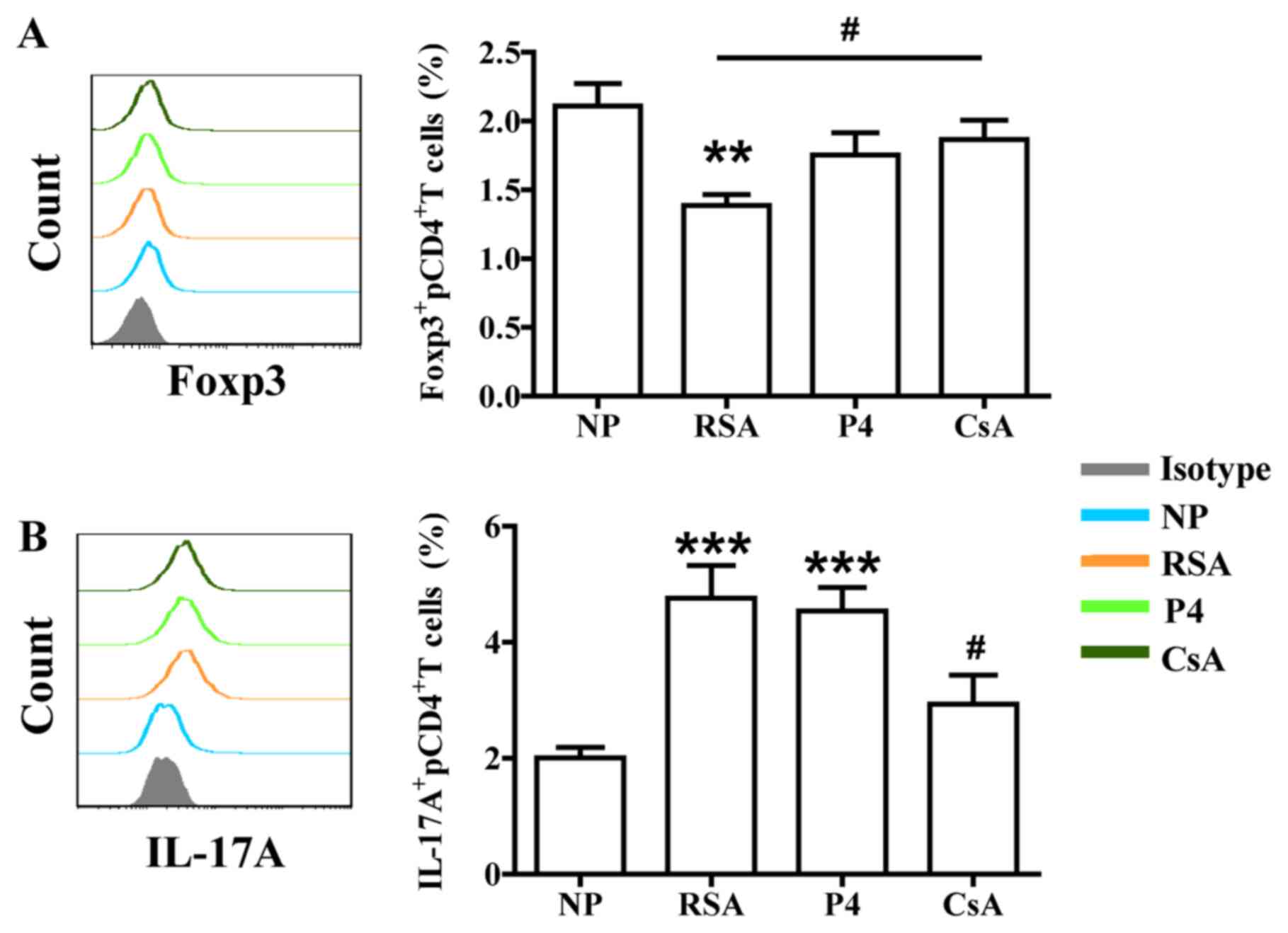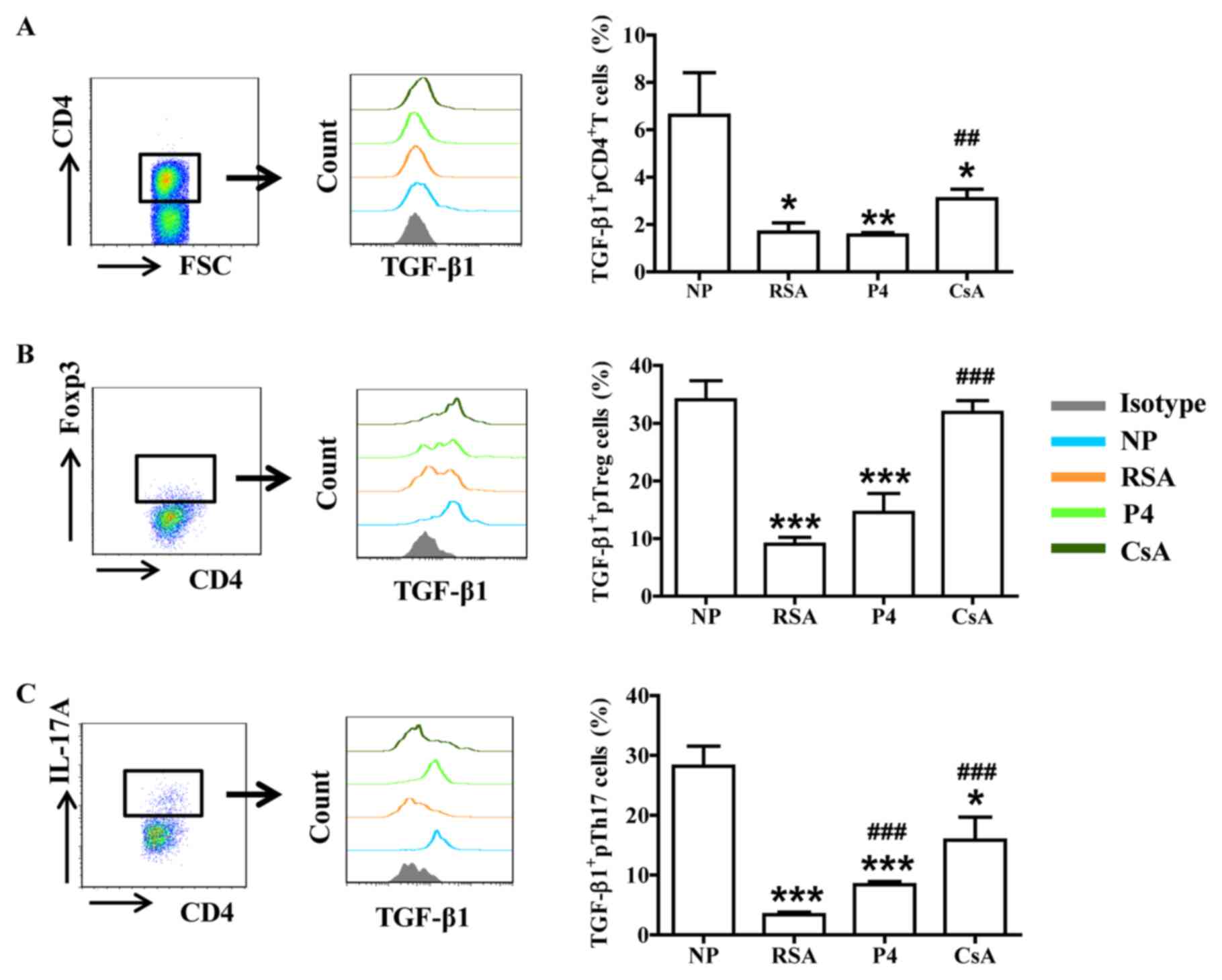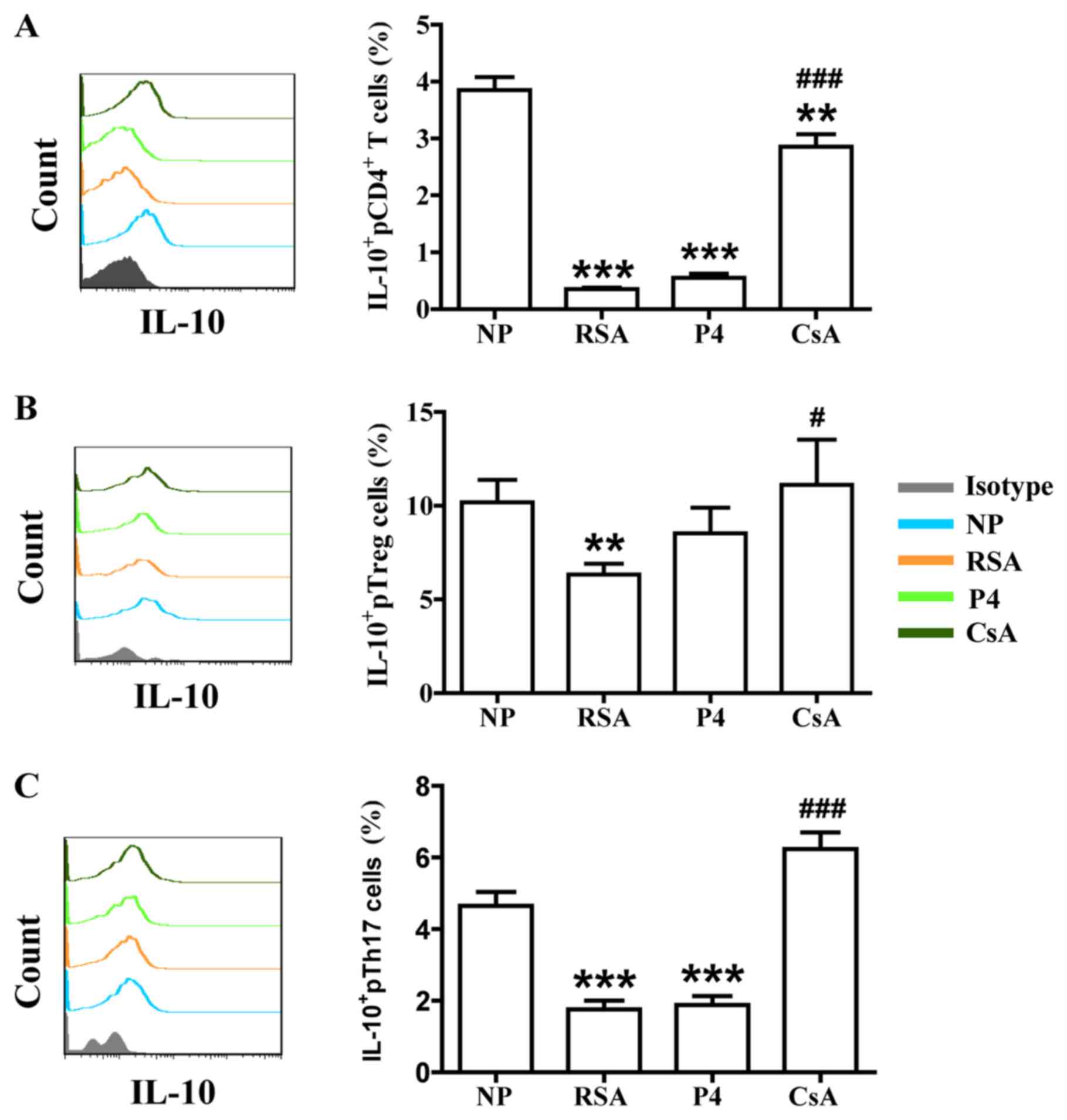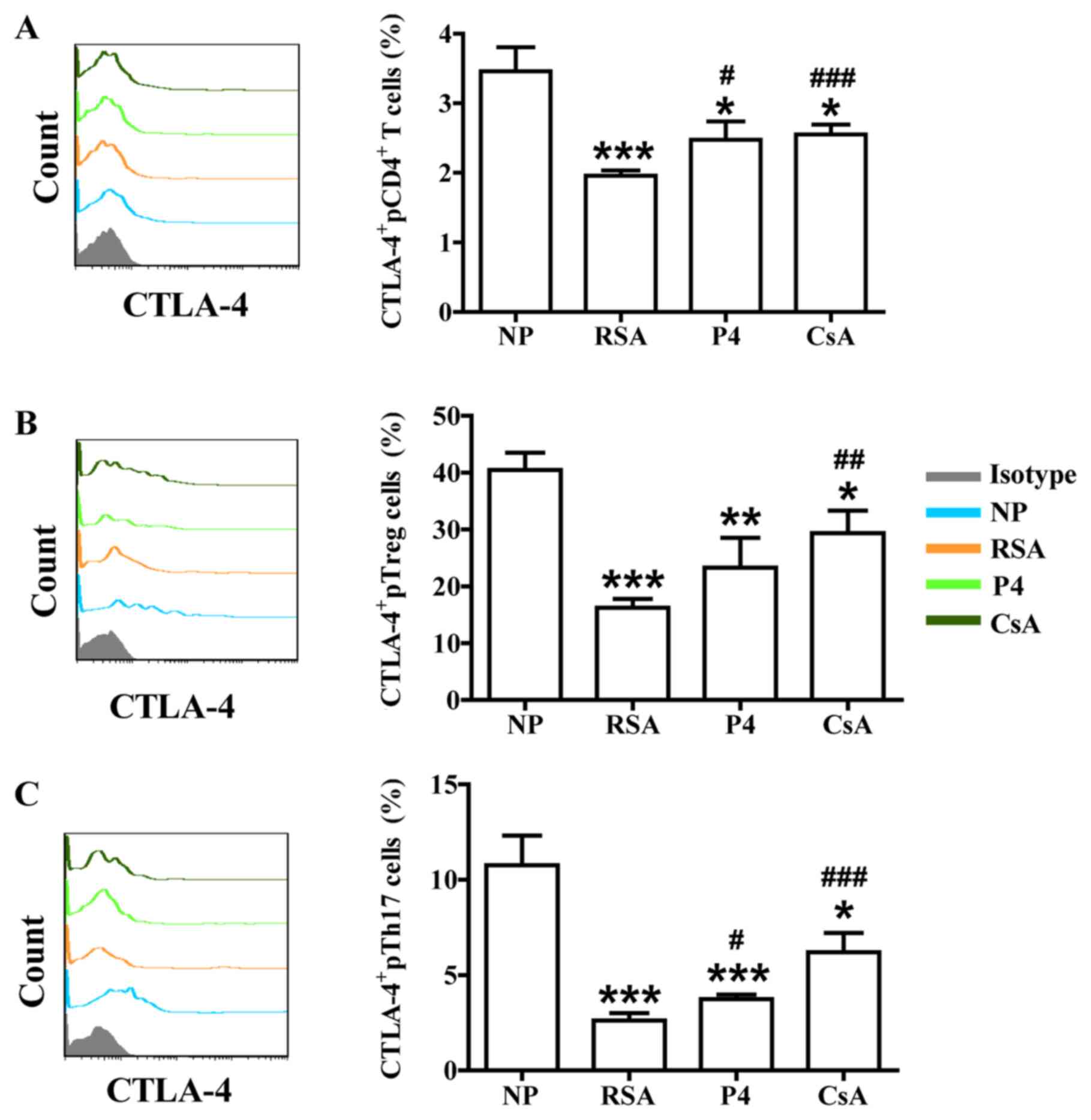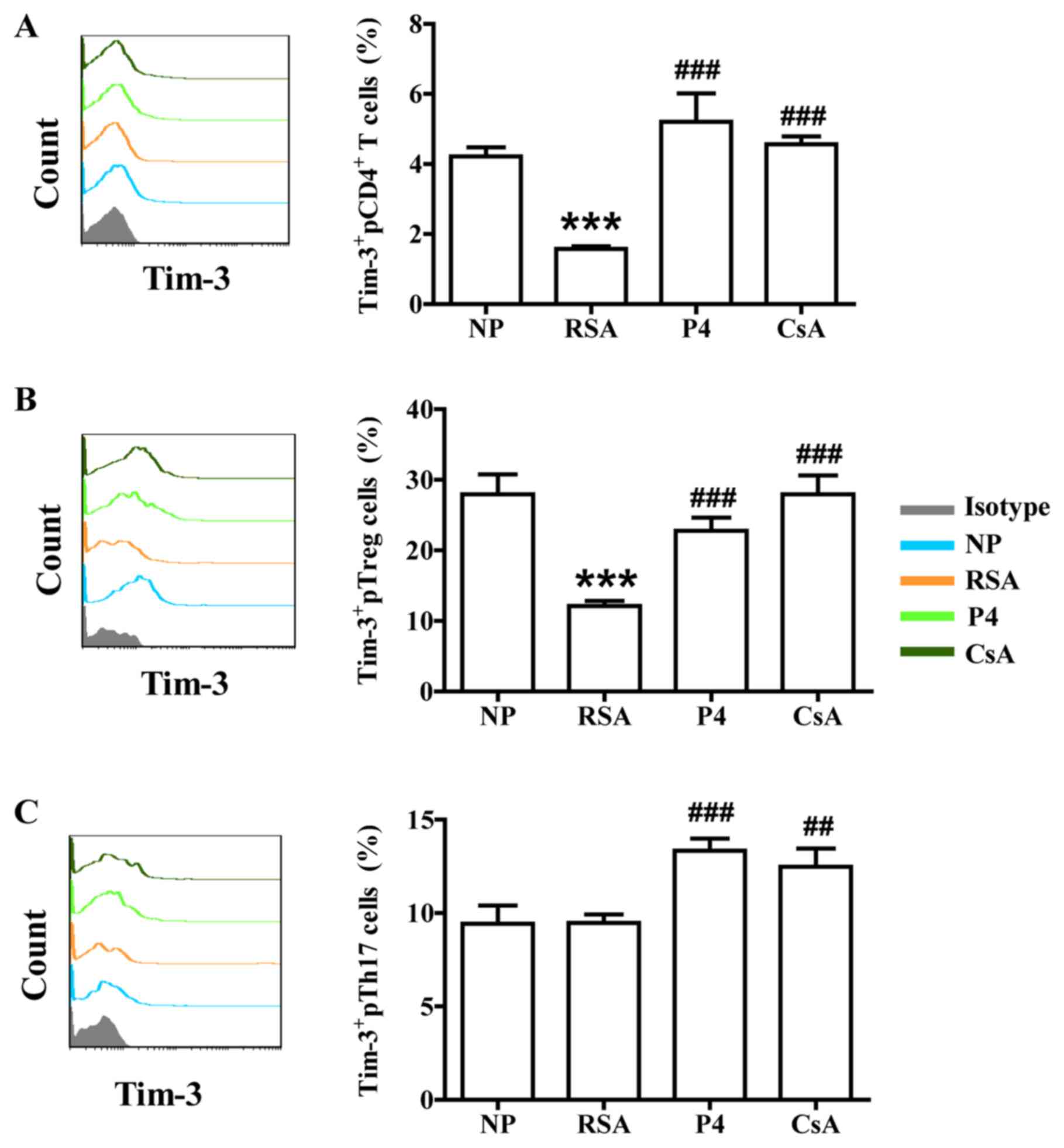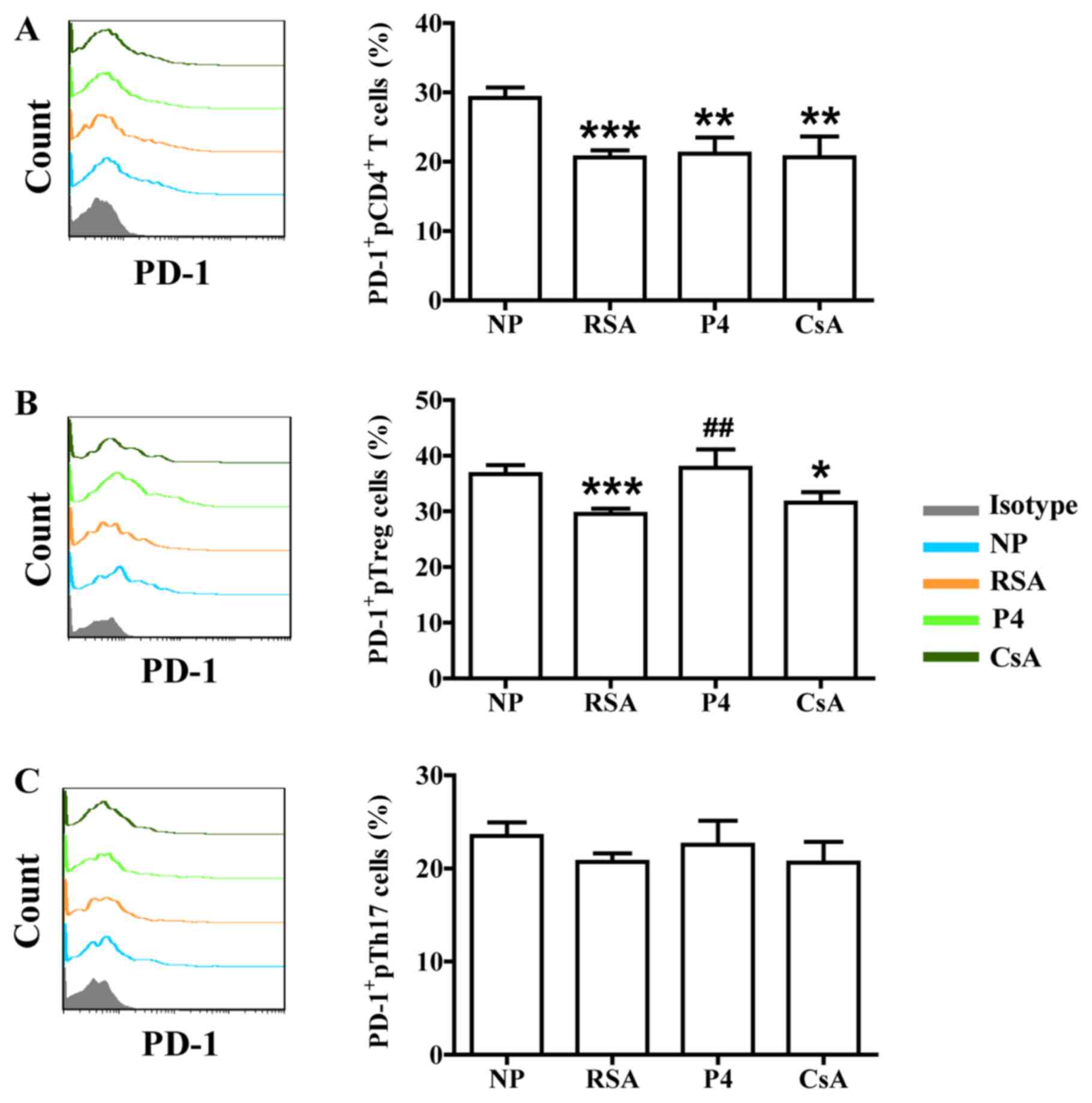|
1
|
Rai R and Regan L: Recurrent miscarriage.
Lancet. 368:601–611. 2006.PubMed/NCBI View Article : Google Scholar
|
|
2
|
Arck PC and Hecher K: Fetomaternal immune
cross-talk and its consequences for maternal and offspring's
health. Nat Med. 19:548–556. 2013.PubMed/NCBI View
Article : Google Scholar
|
|
3
|
Zeng W, Liu Z, Liu X, Zhang S, Khanniche
A, Zheng Y, Ma X, Yu T, Tian F, Liu XR, et al: Distinct
transcriptional and alternative splicing signatures of decidual
CD4+ T cells in early human pregnancy. Front Immunol.
8(682)2017.PubMed/NCBI View Article : Google Scholar
|
|
4
|
Lash GE, Otun HA, Innes BA, Kirkley M, De
Oliveira L, Searle RF, Robson SC and Bulmer JN: Interferon-gamma
inhibits extravillous trophoblast cell invasion by a mechanism that
involves both changes in apoptosis and protease levels. FASEB J.
20:2512–2518. 2006.PubMed/NCBI View Article : Google Scholar
|
|
5
|
Chaouat G: The Th1/Th2 paradigm: Still
important in pregnancy? Semin Immunopathol. 29:95–113.
2007.PubMed/NCBI View Article : Google Scholar
|
|
6
|
Wegmann TG, Lin H, Guilbert L and Mosmann
TR: Bidirectional cytokine interactions in the maternal-fetal
relationship: Is successful pregnancy a TH2 phenomenon? Immunol
Today. 7:353–356. 1993.PubMed/NCBI View Article : Google Scholar
|
|
7
|
Crome SQ, Wang AY and Levings MK:
Translational mini-review series on Th17 Cells: Function and
regulation of human T helper 17 cells in health and disease. Clin
Exp Immunol. 159:109–119. 2010.PubMed/NCBI View Article : Google Scholar
|
|
8
|
Jutel M, Akdis M, Budak F,
Aebischer-Casaulta C, Wrzyszcz M, Blaser K and Akdis CA: IL-10 and
TGF-beta cooperate in the regulatory T cell response to mucosal
allergens in normal immunity and specific immunotherapy. Eur J
Immunol. 33:1205–1214. 2003.PubMed/NCBI View Article : Google Scholar
|
|
9
|
Sheu A, Chan Y, Ferguson A, Bakhtyari MB,
Hawke W, White C, Chan YF, Bertolino PJ, Woon HG, Palendira U, et
al: A proinflammatory CD4+ T cell phenotype in
gestational diabetes mellitus. Diabetologia. 61:1633–1643.
2018.PubMed/NCBI View Article : Google Scholar
|
|
10
|
Muyayalo KP, Li ZH, Mor G and Liao AH:
Modulatory effect of intravenous immunoglobulin on Th17/Treg cell
balance in women with unexplained recurrent spontaneous abortion.
Am J ReprodImmunol. 80(e13018)2018.PubMed/NCBI View Article : Google Scholar
|
|
11
|
Hosseini A, Dolati S, Hashemi V,
Abdollahpour-Alitappeh M and Yousefi M: Regulatory T and T helper
17 cells: Their roles in preeclampsia. J Cell Physiol.
233:6561–6573. 2018.PubMed/NCBI View Article : Google Scholar
|
|
12
|
Game DS and Lechler RI: Pathways of
allorecognition: Implications for transplantation tolerance.
Transpl Immunol. 10:101–108. 2002.PubMed/NCBI View Article : Google Scholar
|
|
13
|
Khoury SJ and Sayegh MH: The roles of the
new negative T cell costimulatory pathways in regulating
autoimmunity. Immunity. 20:529–538. 2004.PubMed/NCBI View Article : Google Scholar
|
|
14
|
Cooksley H, Riva A, Katzarov K,
Hadzhiolova-Lebeau T, Pavlova S, Simonova M, Williams R and Chokshi
S: Differential expression of immune inhibitory checkpoint
signatures on antiviral and inflammatory T cell populations in
chronic hepatitis B. J Interferon Cytokine Res. 38:273–282.
2018.PubMed/NCBI View Article : Google Scholar
|
|
15
|
Zhao J, Lin B, Deng H, Zhi X, Li Y, Liu Y,
Bible PW, Li Q, Xu B, Wei L, et al: Decreased expression of TIM-3
on Th17 cells associated with ophthalmopathy in patients with
Graves' disease. Curr Mol Med. 18:83–90. 2018.PubMed/NCBI View Article : Google Scholar
|
|
16
|
Wei CB, Tao K, Jiang R, Zhou LD, Zhang QH
and Yuan CS: Quercetin protects mouse liver against
triptolide-induced hepatic injury by restoring Th17/Treg balance
through Tim-3 and TLR4-MyD88-NF-κB pathway. Int Immunopharmacol.
53:73–82. 2017.PubMed/NCBI View Article : Google Scholar
|
|
17
|
Zhang Y, Liu Z, Tian M, Hu X, Wang L, Ji J
and Liao A: The altered PD-1/PD-L1 pathway delivers the ‘one-two
punch’ effects to promote the Treg/Th17 imbalance in pre-eclampsia.
Cell Mol Immunol. 15:710–723. 2018.PubMed/NCBI View Article : Google Scholar
|
|
18
|
D'Addio F, Riella LV, Mfarrej BG, Chabtini
L, Adams LT, Yeung M, Yagita H, Azuma M, Sayegh MH and Guleria I:
The link between the PDL1 costimulatory pathway and Th17 in
fetomaternal tolerance. J Immunol. 187:4530–4541. 2011.PubMed/NCBI View Article : Google Scholar
|
|
19
|
Liao H, Peng X, Gan L, Feng J, Gao Y, Yang
S, Hu X, Zhang L, Yin Y, Wang H and Xu X: Protective regulatory T
cell immune response induced by intranasal immunization with the
live-attenuated pneumococcal vaccine SPY1 via the transforming
growth factor-β1-Smad2/3 pathway. Front Immunol.
9(1754)2018.PubMed/NCBI View Article : Google Scholar
|
|
20
|
Kawai K, Uchiyama M, Hester J, Wood K and
Issa F: Regulatory T cells for tolerance. Hum Immunol. 79:294–303.
2018.PubMed/NCBI View Article : Google Scholar
|
|
21
|
Gupta S, Thornley TB, Gao W, Larocca R,
Turka LA, Kuchroo VK and Strom TB: Allograft rejection is
restrained by short-lived TIM-3+PD-1+Foxp3+ tregs. J Clin Invest.
122:2395–2404. 2012.PubMed/NCBI View
Article : Google Scholar
|
|
22
|
Wang S, Zhu X, Xu Y, Zhang D, Li Y, Tao Y,
Piao H, Li D and Du M: Programmed cell death-1 (PD-1) and T-cell
immunoglobulin mucin-3 (Tim-3) regulate CD4+ T cells to induce type
2 helper T Cell (Th2) bias at the maternal-fetal interface. Hum
Reprod. 31:700–711. 2016.PubMed/NCBI View Article : Google Scholar
|
|
23
|
Wang S, Chen C, Li M, Qian J, Sun F, Li Y,
Yu M, Wang M, Zang X, Zhu R, et al: Blockade of CTLA-4 and Tim-3
pathways induces fetal loss with altered cytokine profiles by
decidual CD4+ T cells. Cell Death Dis.
10(15)2019.PubMed/NCBI View Article : Google Scholar
|
|
24
|
Spencer TE and Bazer FW: Biology of
progesterone action during pregnancy recognition and maintenance of
pregnancy. Front Biosci. 7:d1879–d1898. 2002.PubMed/NCBI View
Article : Google Scholar
|
|
25
|
Arck P, Hansen PJ, Mulac Jericevic B,
Piccinni MP and Szekeres-Bartho J: Progesterone during pregnancy:
Endocrine-immune cross talk in mammalian species and the role of
stress. Am J Reprod Immunol. 58:268–279. 2007.PubMed/NCBI View Article : Google Scholar
|
|
26
|
Sketris I, Yatscoff R, Keown P, Canafax
DM, First MR, Holt DW, Schroeder TJ and Wright M: Optimizing the
use of cyclosporine in renal transplantation. Clin Biochem.
28:195–211. 1995.PubMed/NCBI View Article : Google Scholar
|
|
27
|
Du MR, Dong L, Zhou WH, Yan FT and Li DJ:
Cyclosporin a improves pregnancy outcome by promoting functions of
trophoblasts and inducing maternal tolerance to the allogeneic
fetus in abortion-prone matings in the mouse. Biol Reprod.
76:906–914. 2007.PubMed/NCBI View Article : Google Scholar
|
|
28
|
Xu YY, Wang SC, Li DJ and Du MR:
Co-signaling molecules in maternal-fetal immunity. Trends Mol Med.
23:46–58. 2017.PubMed/NCBI View Article : Google Scholar
|
|
29
|
Di Renzo GC, Giardina I, Clerici G, Brillo
E and Gerli S: Progesterone in Normal and Pathological Pregnancy.
Horm Mol Biol Clin Investig. 27:35–48. 2016.PubMed/NCBI View Article : Google Scholar
|
|
30
|
Chien EJ, Chang CP, Lee WF, Su TH and Wu
CH: Non-genomic immunosuppressive actions of progesterone inhibits
PHA-induced alkalinization and activation in T cells. J Cell
Biochem. 99:292–304. 2006.PubMed/NCBI View Article : Google Scholar
|
|
31
|
Piccinni MP, Giudizi MG, Biagiotti R,
Beloni L, Giannarini L, Sampognaro S, Parronchi P, Manetti R,
Annunziato F, Livi C, et al: Progesterone favors the development of
human T helper cells producing Th2-type cytokines and promotes both
IL-4 production and membrane CD30 expression in established Th1
cell clones. J Immunol. 155:128–133. 1995.PubMed/NCBI
|
|
32
|
Mjosberg J, Svensson J, Johansson E,
Hellström L, Casas R, Jenmalm MC, Boij R, Matthiesen L, Jönsson JI,
Berg G and Ernerudh J: Systemic reduction of functionally
suppressive CD4dimCD25highFoxp3+ Tregs in human second trimester
pregnancy is induced by progesterone and 17beta-estradiol. J
Immunol. 183:759–769. 2009.PubMed/NCBI View Article : Google Scholar
|
|
33
|
Lee JH, Ulrich B, Cho J, Park J and Kim
CH: Progesterone promotes differentiation of human cord blood fetal
T cells into T regulatory cells but suppresses their
differentiation into Th17 cells. J Immunol. 187:1778–1787.
2011.PubMed/NCBI View Article : Google Scholar
|
|
34
|
Fu B, Tian Z and Wei H: TH17 Cells in
human recurrent pregnancy loss and pre-eclampsia. Cell Mol Immunol.
11:564–570. 2014.PubMed/NCBI View Article : Google Scholar
|
|
35
|
Wang S, Qian J, Sun F, Li M, Ye J, Li M,
Du M and Li D: Bidirectional regulation between 1st trimester
HTR8/SVneo trophoblast cells and in vitro differentiated Th17/Treg
cells suggest a fetal-maternal regulatory loop in human pregnancy.
Am J Reprod Immunol. 81(e13106)2019.PubMed/NCBI View Article : Google Scholar
|
|
36
|
Wu HX, Jin LP, Xu B, Liang SS and Li DJ:
Decidual stromal cells recruit Th17 cells into decidua to promote
proliferation and invasion of human trophoblast cells by secreting
IL-17. Cell Mol Immunol. 11:253–262. 2014.PubMed/NCBI View Article : Google Scholar
|
|
37
|
Lee Y, Awasthi A, Yosef N, Quintana FJ,
Xiao S, Peters A, Wu C, Kleinewietfeld M, Kunder S, Hafler DA, et
al: Induction and molecular signature of pathogenic TH17 cells. Nat
Immunol. 13:991–999. 2012.PubMed/NCBI View Article : Google Scholar
|
|
38
|
McGeachy MJ, Bak-Jensen KS, Chen Y, Tato
CM, Blumenschein W, McClanahan T and Cua D: TGF-beta and IL-6 drive
the production of IL-17 and IL-10 by T cells and restrain T(H)-17
cell-mediated pathology. Nat Immunol. 8:1390–1397. 2007.PubMed/NCBI View Article : Google Scholar
|
|
39
|
Gutcher I, Donkor MK, Ma Q, Rudensky AY,
Flavell RA and Li MO: Autocrine transforming growth factor-β1
promotes in vivo Th17 cell differentiation. Immunity. 34:396–408.
2011.PubMed/NCBI View Article : Google Scholar
|
|
40
|
Coomarasamy A, Williams H, Truchanowicz E,
Seed PT, Small R, Quenby S, Gupta P, Dawood F, Koot YE, Bender Atik
R, et al: A randomized trial of progesterone in women with
recurrent miscarriages. N Engl J Med. 373:2141–2148.
2015.PubMed/NCBI View Article : Google Scholar
|
|
41
|
Coomarasamy A, Williams H, Truchanowicz E,
Seed PT, Small R, Quenby S, Gupta P, Dawood F, Koot YE, Atik RB, et
al: PROMISE: First-trimester progesterone therapy in women with a
history of unexplained recurrent miscarriages-a randomised,
double-blind, placebo-controlled, international multicentre trial
and economic evaluation. Health Technol Assess. 20:1–92.
2016.PubMed/NCBI View Article : Google Scholar
|
|
42
|
Piao HL, Wang SC, Tao Y, Zhu R, Sun C, Fu
Q, Du MR and Li DJ: Cyclosporine A enhances Th2 bias at the
maternal-fetal interface in early human pregnancy with aid of the
interaction between maternal and fetal cells. PLoS One.
7(e45275)2012.PubMed/NCBI View Article : Google Scholar
|
|
43
|
Zhou WH, Dong L, Du MR, Zhu XY and Li DJ:
Cyclosporin a improves murine pregnancy outcome in abortion-prone
matings: Involvement of CD80/86 and CD28/CTLA-4. Reproduction.
135:385–395. 2008.PubMed/NCBI View Article : Google Scholar
|
|
44
|
Huang Y, Ma Y, Ma L, Mao JL, Zhang Y, Du
MR and Li DJ: Cyclosporine A improves adhesion and invasion of
mouse preimplantation embryos via upregulating integrin β3 and
matrix metalloproteinase-9. Int J Clin Exp Patho. 7:1379–1388.
2014.PubMed/NCBI
|
|
45
|
Du MR, Zhou WH, Yan FT, Zhu XY, He YY,
Yang JY and Li DJ: Cyclosporine A induces titin expression via
MAPK/ERK signalling and improves proliferative and invasive
potential of human trophoblast cells. Hum Reprod. 22:2528–2537.
2007.PubMed/NCBI View Article : Google Scholar
|
|
46
|
Zhou WH, Du MR, Dong L, Zhu XY, Yang JY,
He YY and Li DJ: Cyclosporina increases expression of matrix
metalloproteinase 9 and 2 and invasiveness in vitro of the
first-trimester human trophoblast cells via the mitogen-activated
protein kinase pathway. Hum Reprod. 22:2743–2750. 2007.PubMed/NCBI View Article : Google Scholar
|
|
47
|
Fu JH: Analysis of the use of cyclosporina
to treat refractory immune recurrent spontaneous abortion. Clin Exp
Obstet Gynecol. 42:739–742. 2015.PubMed/NCBI
|
|
48
|
Ling Y, Huang Y, Chen C, Mao J and Zhang
H: Low dose cyclosporin a treatment increases live birth rate of
unexplained recurrent abortion-initial cohort study. Clin Exp
Obstet Gynecol. 44:230–235. 2017.PubMed/NCBI
|
|
49
|
Martínez-Zamora MÁ, Cervera R and Balasch
J: Recurrent miscarriage, antiphospholipid antibodies and the risk
of thromboembolic disease. Clin Rev Allergy Immunol. 43:265–274.
2012.PubMed/NCBI View Article : Google Scholar
|















